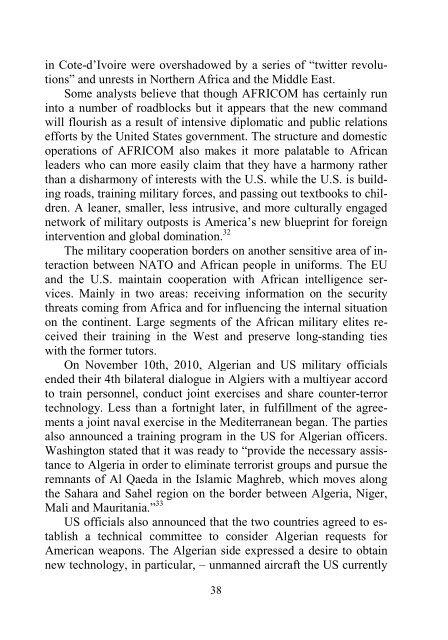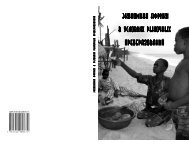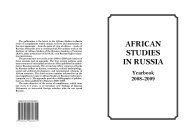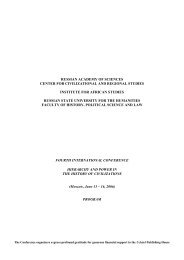L. Fituni, I. Abramova Resource Potential of Africa and Russia's ...
L. Fituni, I. Abramova Resource Potential of Africa and Russia's ...
L. Fituni, I. Abramova Resource Potential of Africa and Russia's ...
You also want an ePaper? Increase the reach of your titles
YUMPU automatically turns print PDFs into web optimized ePapers that Google loves.
in Cote-d’Ivoire were overshadowed by a series <strong>of</strong> “twitter revolutions”<br />
<strong>and</strong> unrests in Northern <strong>Africa</strong> <strong>and</strong> the Middle East.<br />
Some analysts believe that though AFRICOM has certainly run<br />
into a number <strong>of</strong> roadblocks but it appears that the new comm<strong>and</strong><br />
will flourish as a result <strong>of</strong> intensive diplomatic <strong>and</strong> public relations<br />
efforts by the United States government. The structure <strong>and</strong> domestic<br />
operations <strong>of</strong> AFRICOM also makes it more palatable to <strong>Africa</strong>n<br />
leaders who can more easily claim that they have a harmony rather<br />
than a disharmony <strong>of</strong> interests with the U.S. while the U.S. is building<br />
roads, training military forces, <strong>and</strong> passing out textbooks to children.<br />
A leaner, smaller, less intrusive, <strong>and</strong> more culturally engaged<br />
network <strong>of</strong> military outposts is America’s new blueprint for foreign<br />
intervention <strong>and</strong> global domination. 32<br />
The military cooperation borders on another sensitive area <strong>of</strong> interaction<br />
between NATO <strong>and</strong> <strong>Africa</strong>n people in uniforms. The EU<br />
<strong>and</strong> the U.S. maintain cooperation with <strong>Africa</strong>n intelligence services.<br />
Mainly in two areas: receiving information on the security<br />
threats coming from <strong>Africa</strong> <strong>and</strong> for influencing the internal situation<br />
on the continent. Large segments <strong>of</strong> the <strong>Africa</strong>n military elites received<br />
their training in the West <strong>and</strong> preserve long-st<strong>and</strong>ing ties<br />
with the former tutors.<br />
On November 10th, 2010, Algerian <strong>and</strong> US military <strong>of</strong>ficials<br />
ended their 4th bilateral dialogue in Algiers with a multiyear accord<br />
to train personnel, conduct joint exercises <strong>and</strong> share counter-terror<br />
technology. Less than a fortnight later, in fulfillment <strong>of</strong> the agreements<br />
a joint naval exercise in the Mediterranean began. The parties<br />
also announced a training program in the US for Algerian <strong>of</strong>ficers.<br />
Washington stated that it was ready to “provide the necessary assistance<br />
to Algeria in order to eliminate terrorist groups <strong>and</strong> pursue the<br />
remnants <strong>of</strong> Al Qaeda in the Islamic Maghreb, which moves along<br />
the Sahara <strong>and</strong> Sahel region on the border between Algeria, Niger,<br />
Mali <strong>and</strong> Mauritania.” 33<br />
US <strong>of</strong>ficials also announced that the two countries agreed to establish<br />
a technical committee to consider Algerian requests for<br />
American weapons. The Algerian side expressed a desire to obtain<br />
new technology, in particular, – unmanned aircraft the US currently<br />
38







